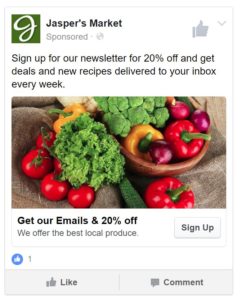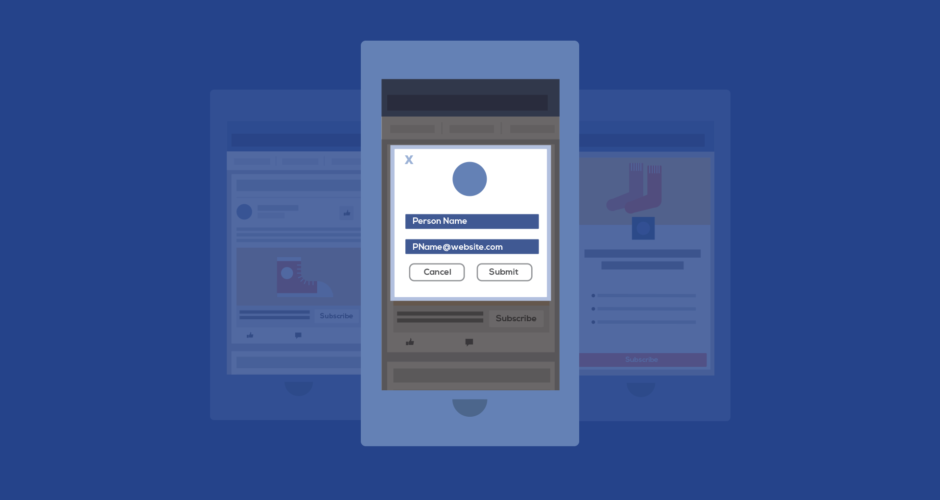What is a Facebook Lead Ad?
A Facebook Lead Ad provides a form for users to submit contact information. The most common request is email address, but you can ask for address, phone number, and more. The two biggest differences from other Facebook ads is the interactivity (users fill in the form right there) and the ability to stay within Facebook. That means no clicking through to your site, increasing the likelihood that someone will interact with your Facebook Lead Ad, since it doesn’t interrupt their intended action.

Image credit: Facebook
Since Facebook already has so much information on the user, they can pre-fill fields for them, saving time and making the lead submission process easier for the user.
Jasper’s Market shows an example of a Facebook Lead Ad, in case you’re not familiar. It can look similar to other Facebook advertising products, as you can see, but the key differentiator is the interactive form that keeps them in the Newsfeed.
Use a Facebook Lead Ad: high touch or high cost products
If your product or service is fairly intensive, involving consultations or long-term setup, a Facebook Lead Ad is a great first step toward meeting customers. The same is true of an expensive proposition: if there is a significant financial outlay for them, they are not going to immediately click through to buy, so a Facebook Lead Ad allows a softer approach. Often these products or services require a conversation, so a traditional Facebook ad wouldn’t work at all, as they cannot buy direct. So instead of clicking off Facebook to a lead form on your site, you can gather all their information right in the newsfeed.
Use a Facebook Lead Ad: intangible items
If your product isn’t ready or you’ve sold out and are on a waitlist, a Facebook Lead Ad is a great way to keep interest up and let shoppers know when the product is ready. This is also a viable option for an early opt-in program, kind of like Kickstarter. Other types of intangible items will lend themselves to a Facebook Lead Ad as well, such as a design consultation or other transaction that doesn’t always end with a physical good.
Use a Facebook Lead Ad: re-engage fans
If your Facebook page engagement has been lagging (as many do), a Facebook Lead Ad can help you reactivate those fans you worked so hard to gain. These ads can be useful to remind them of offerings, or just get them to interact with you again. Once a fan takes action on this paid ad, they are more likely to see your organic content again. And since a Facebook Lead Ad is the only ad that doesn’t require a user to click off the site, it can be the easiest way to re-engage fans. Plus, they already know you, so it’s a warm lead if you want to push to convert them. You can also switch them to your email list if it seems Facebook isn’t working for some of your audience anymore.
Use a Facebook Lead Ad: offer is low commitment
On the flip side of a high-touch product or service, extremely low barrier to entry products can also benefit from a Facebook Lead Ad. If there is little to no risk to the customer, they won’t feel the pull to visit your website and investigate more. So you can save development resources by not adding a landing page. This can make it much easier to convert, since you won’t lose them mid-click.
Don’t use a Facebook Lead Ad: direct purchase
If a user can just click to buy your product fairly quickly and easily, a Facebook Lead Ad just clutters the process. Stick to a website carousel ad showcasing your product feed.
Don’t use a Facebook Lead Ad: without clear policies
Facebook requires you to put the URL of your privacy policy, but they don’t check what it covers. Make sure that you state what you do with the information that is collected. Don’t have a policy? Get one and publish it on your site before launching a Facebook lead ad. Regulated industries may also want to steer clear of information collection through Facebook lead ads, or at the very least brush up on industry standards. And no matter what you are offering, make sure to set restrictions in your Facebook Lead Ad targeting profile that match your customer—you don’t want to waste money or legal issues targeting those who are underage or out of market for your product.
Don’t use a Facebook Lead Ad: as first/only ad set
Facebook Lead ads are a much more advanced advertising product with more creative and messaging inputs than most. Make sure you are well-versed in Facebook advertising before jumping into Facebook Lead Ads.
They are not always the best first impression, so you may want to run a series of ads warming customers up to your brand before targeting them with a lead form. And remember that a Facebook Lead Ad requires follow up, so don’t run one that you’re not ready to deliver on just yet.

